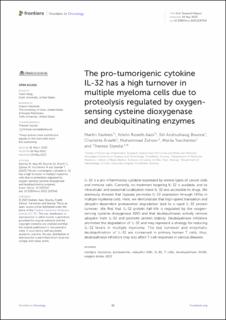The pro-tumorigenic cytokine IL-32 has a high turnover in multiple myeloma cells due to proteolysis regulated by oxygen-sensing cysteine dioxygenase and deubiquitinating enzymes
Kastnes, Martin Haugrud; Aass, Kristin Roseth; Bouma, Siri Anshushaug; Årseth, Charlotte; Zahoor, Muhammad; Yurchenko, Mariya; Standal, Therese
Peer reviewed, Journal article
Published version
Permanent lenke
https://hdl.handle.net/11250/3099660Utgivelsesdato
2023Metadata
Vis full innførselSamlinger
Originalversjon
10.3389/fonc.2023.1197542Sammendrag
IL-32 is a pro-inflammatory cytokine expressed by several types of cancer cells and immune cells. Currently, no treatment targeting IL-32 is available, and its intracellular and exosomal localization make IL-32 less accessible to drugs. We previously showed that hypoxia promotes IL-32 expression through HIF1α in multiple myeloma cells. Here, we demonstrate that high-speed translation and ubiquitin-dependent proteasomal degradation lead to a rapid IL-32 protein turnover. We find that IL-32 protein half-life is regulated by the oxygen-sensing cysteine-dioxygenase ADO and that deubiquitinases actively remove ubiquitin from IL-32 and promote protein stability. Deubiquitinase inhibitors promoted the degradation of IL-32 and may represent a strategy for reducing IL-32 levels in multiple myeloma. The fast turnover and enzymatic deubiquitination of IL-32 are conserved in primary human T cells; thus, deubiquitinase inhibitors may also affect T-cell responses in various diseases.

